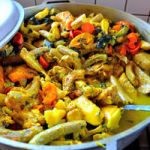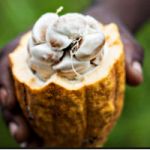 |
A culinary journey to Grenada, the spice island
West Indian and Creole flavors combine to produce a unique cuisine that is distinctly Grenadian. Creole cuisine and seafood are Grenada’s specialties and the inspiration for some of the island’s best restaurants.

And, of course, all Grenadian cuisine is enhanced by the wide variety of spices grown on the island, including nutmeg, cinnamon, vanilla, and ginger, to name just a few. For instance, nutmeg, which is the island’s principal spice, is infused into everything from candy to ice cream.

Grenada’s more exotic dishes include "Oildown," which is the national dish and consists of a stew made with salted meat, breadfruit, onion, carrot, celery, dasheen (a root vegetable grown locally) and dumplings, all slowly steamed in coconut milk until the liquid is absorbed. It is normally cooked on fire sides. It takes a while to prepare and cook oil down but as the old saying goes many hands make light work , so the more people there are helping the faster the dish is completed and it also shows the togetherness of every body making the dish. The dish gets its name from the oil that is produced by the coconut milk in the the pot
Seafood of all kinds is very popular and plentiful, with Grenadian caviar (roe of white sea urchin), conch and a fish dish called "Stuffed Jacks"
Grenadians love their cocoa trees. Here everyone, from government ministers to fishermen, has a tree that he cares for after work or on the weekends, using time-honoured techniques. They are careful not to prune them during a full moon when the evil spirit could come and take up residence in the cocoa pods. All Grenadians obtain their seedlings from the national nursery in order to ensure production quality is maintained. Some 6000 small producers are members of the Grenada Cocoa Association and adhere to its standards of quality.
Every small planter brings his production to Belmont or La Vilette and every fifteen minutes the women take a turn pressing the cocoa while swaying to old Creole songs.

In Grenada, the woman sees chocolate only in terms of the two kilograms provided by each tree in her yard. Two times a year, she dries the beans in the sun and roasts them in the oven before shelling the pods and reducing them to paste in a chopper. Too bitter on its own, the blackish chocolate is flavoured with a pinch of cinnamon, nutmeg and vanilla… then add some sugar and milk and roll this paste by hand like a big cigar and boil it in water, she tells us rather hoarsely. Her head, nodding from left to right, seems to say: Who would not know the recipe, when here it is passed on from mother to daughter? It's excellent in the morning with ham, she says. I serve it to my children every morning - it's good for their muscles and for healthy perspiration.

-

 Recipes
Recipes
-

 Products
Products
-

 Entertaining
Entertaining
-

 Chefs
Chefs
-

 Hints & Tips
Hints & Tips
-

 Glossaries
Glossaries








